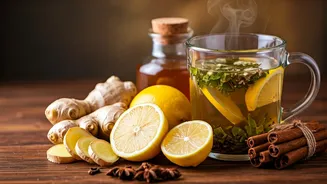Hydration is Key
Staying hydrated is crucial when fighting the flu. Fluids help thin mucus, making it easier to breathe, and prevent dehydration, which can worsen symptoms.
One easy remedy is warm water with lemon and honey. Lemon provides vitamin C, an antioxidant that boosts the immune system, and honey soothes a sore throat. Another option is herbal tea, which can provide hydration and additional beneficial properties. Avoid sugary drinks like sodas, as they can hinder recovery. Aim to sip fluids consistently throughout the day to support your body's natural defenses and expedite your recovery process. Proper hydration can shorten the duration of the flu and reduce its impact on your overall health. Drinking plenty of water, broth, or clear juices can make a significant difference in your recovery time and lessen the severity of your symptoms. Ensure you are drinking enough fluids and monitor your hydration levels throughout the day.
Honey and Lemon
Honey and lemon have long been recognized for their soothing properties. Honey, a natural cough suppressant, can calm irritated throats. Lemon, rich in vitamin C, supports the immune system. To use this remedy, mix a tablespoon of honey with the juice of half a lemon in a cup of warm water. This mixture can be taken several times a day to ease coughing and soothe a sore throat. It's especially beneficial when you feel the first signs of a cold or flu. The combination works synergistically, providing both relief from symptoms and support for your body's natural defenses. Honey also has antibacterial properties, which can help fight off infections. This simple, natural remedy is a convenient and effective way to manage common flu symptoms. Consider this your go-to solution for throat discomfort and cough relief during the flu season.
Ginger's Healing Power
Ginger is renowned for its anti-inflammatory and anti-nausea properties, making it an excellent remedy for flu symptoms. It can help reduce inflammation, ease muscle aches, and calm upset stomachs. Prepare a ginger tea by simmering fresh ginger slices in water for about 10-15 minutes. You can also add lemon and honey for extra benefits. Drinking ginger tea can help reduce fever and relieve nausea. Ginger's compounds, such as gingerol, have been shown to boost the immune system and fight off viruses. This natural remedy can provide quick relief from flu-related discomforts. The tea is soothing and can make you feel more comfortable and relaxed. Including ginger in your routine can make a significant difference in how you experience the flu.
Garlic's Antiviral Abilities
Garlic is a potent antiviral agent that can help prevent and treat flu infections. It contains allicin, a compound with strong medicinal properties. Consuming garlic raw or slightly cooked can maximize its benefits. Consider adding minced garlic to your meals or swallowing crushed cloves with water. Alternatively, you can take garlic supplements. The sulfur compounds in garlic help strengthen your immune system and fight off viruses. It helps reduce the severity and duration of flu symptoms. Garlic can also help prevent secondary infections. Including garlic in your diet regularly, especially during flu season, can be a proactive step towards staying healthy and reducing your risk of getting sick. Regularly consuming garlic may provide long-term benefits for your overall well-being.
Steam Inhalation Relief
Steam inhalation can provide quick relief from congestion. The warm, moist air helps to loosen mucus and clear nasal passages. To use this remedy, add a few drops of essential oils like eucalyptus or tea tree to a bowl of hot water. Then, lean over the bowl, covering your head with a towel to trap the steam. Inhale deeply for 10-15 minutes. Steam inhalation can also soothe a sore throat. This simple technique can alleviate sinus pressure and help you breathe more comfortably. The added essential oils provide additional benefits, such as antibacterial and antiviral properties. Steam inhalation is a safe, effective, and readily accessible remedy for flu-related congestion and discomfort. Perform steam inhalation multiple times a day as needed to get relief and feel better.
Turmeric's Anti-Inflammatory Action
Turmeric, with its active compound curcumin, is a potent anti-inflammatory agent. It can reduce swelling and pain associated with the flu. Make a turmeric tea by mixing a teaspoon of turmeric powder with a cup of hot water and adding black pepper to increase absorption. This tea can soothe inflammation and promote healing. Turmeric also has antioxidant properties that can boost the immune system and help fight off infections. Regular consumption of turmeric can reduce the severity of flu symptoms. This remedy is not only effective but also easy to prepare, making it a valuable addition to your flu-fighting arsenal. Consider adding turmeric to your diet during the flu season to get its protective benefits. By incorporating this remedy, you can potentially reduce your discomfort and aid your body's recovery.
Chicken Soup's Comfort
Chicken soup is a time-tested remedy for the flu, offering both comfort and healing benefits. It provides hydration and is easy to digest. The warmth of the soup can soothe a sore throat, and the nutrients can support the immune system. Chicken soup contains amino acids that help reduce inflammation, while the broth is rich in minerals that aid in recovery. Make a homemade chicken soup with vegetables for added nutrients. It is a comforting and nourishing option when you're feeling unwell. This traditional remedy can make you feel better both physically and emotionally. The combination of nutrients and comfort makes chicken soup a great choice when dealing with the flu.
Rest and Sleep
Rest and sleep are crucial for recovery from the flu. Your body needs energy to fight the virus, and sleep allows your immune system to work efficiently. Aim for at least 7-9 hours of sleep each night. Create a comfortable sleep environment, ensuring your room is dark, quiet, and cool. Avoid strenuous activities and reduce stress to help your body rest and recover. Take naps during the day if needed. Rest allows your body to focus on healing, and it can significantly shorten the duration of the flu. Prioritizing rest helps to avoid secondary infections. Allowing your body to rest enables a more efficient response to the virus, therefore accelerating the recovery process. Proper rest and sleep support your immune system.
Vitamin C Boost
Vitamin C is a powerful antioxidant that supports the immune system and can help reduce the severity and duration of the flu. Consume foods rich in vitamin C, such as oranges, grapefruits, kiwis, and strawberries. If you find it difficult to get enough vitamin C from food, consider taking a supplement. Vitamin C can help boost your immune response and fight off the flu virus. Vitamin C can also reduce the severity of symptoms and speed up recovery. Consuming vitamin C-rich foods or supplements daily can be a proactive step toward preventing the flu. Supplementing Vitamin C helps boost the body’s defenses and reduce the time spent battling the flu. Ensure you incorporate adequate Vitamin C for optimal health.
Echinacea for Immunity
Echinacea is an herb known for its immune-boosting properties. It can help reduce the duration and severity of the flu. Echinacea can stimulate the immune system and help fight off viruses. It is available as a supplement in various forms, including tablets, capsules, and tinctures. Echinacea is best taken at the first sign of symptoms. It can shorten the duration of your illness. It helps enhance the body's natural defense mechanisms. Taking Echinacea can significantly impact your recovery. Always follow the recommended dosage on the product packaging, and consult a healthcare professional if you have any underlying health conditions or are taking other medications. Echinacea may not be suitable for everyone, so seek advice.












